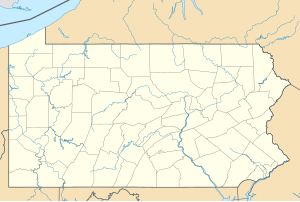Horseshoe Curve (Altoona, Pennsylvania)
|
Horseshoe Curve
|
|

Orthophoto of the Horseshoe Curve. Trains headed counterclockwise around the curve are ascending. The visitor center and observation park are at the apex of the curve, and a reservoir is located in the valley spanned by it.
|
|
| Location | Logan Township, Blair County, Pennsylvania |
|---|---|
| Nearest city | Altoona, Pennsylvania |
| Coordinates | 40°29′51.5″N 78°29′3″W / 40.497639°N 78.48417°WCoordinates: 40°29′51.5″N 78°29′3″W / 40.497639°N 78.48417°W |
| Built | 1851–1854 |
| Architect |
John Edgar Thomson, Pennsylvania Railroad |
| NRHP reference # | 66000647 |
| Significant dates | |
| Added to NRHP | November 13, 1966 |
| Designated NHL | November 13, 1966 |
Horseshoe Curve is a three-track railroad curve on Norfolk Southern Railway's Pittsburgh Line in Blair County, Pennsylvania. The curve itself is about 2,375 feet (700 m) long and 1,300 feet (400 m) in diameter; it was completed in 1854 by the Pennsylvania Railroad as a way to lessen the grade to the summit of the Allegheny Mountains. It eventually replaced the time-consuming Allegheny Portage Railroad, the only other route across the mountains for large vehicles.
The rail line has been important since its opening, and during World War II the Curve was targeted by Nazi Germany in 1942 as part of Operation Pastorius. The Curve was later owned and used by Pennsylvania Railroad successors Penn Central, Conrail, and Norfolk Southern. Horseshoe Curve was added to the National Register of Historic Places and designated a National Historic Landmark in 1966, and became a National Historic Civil Engineering Landmark in 2004.
Horseshoe Curve has long been a tourist attraction with a trackside observation park being completed in 1879. In the early 1990s the park was renovated and a visitor center built; the Railroaders Memorial Museum in Altoona manages the center, which has exhibits pertaining to the curve.
Horseshoe Curve is on the Pittsburgh Line, the Norfolk Southern Railway Pittsburgh Division main line between Pittsburgh and Harrisburg, Pennsylvania. Westbound trains climb a maximum grade of 1.85 percent for 12 miles (19 km) from Altoona to Gallitzin; just west of the Gallitzin Tunnels trains pass the summit of the Allegheny Mountains, then descend for 25 miles (40 km) to Johnstown on a grade of 1.1 percent or less.
...
Wikipedia


